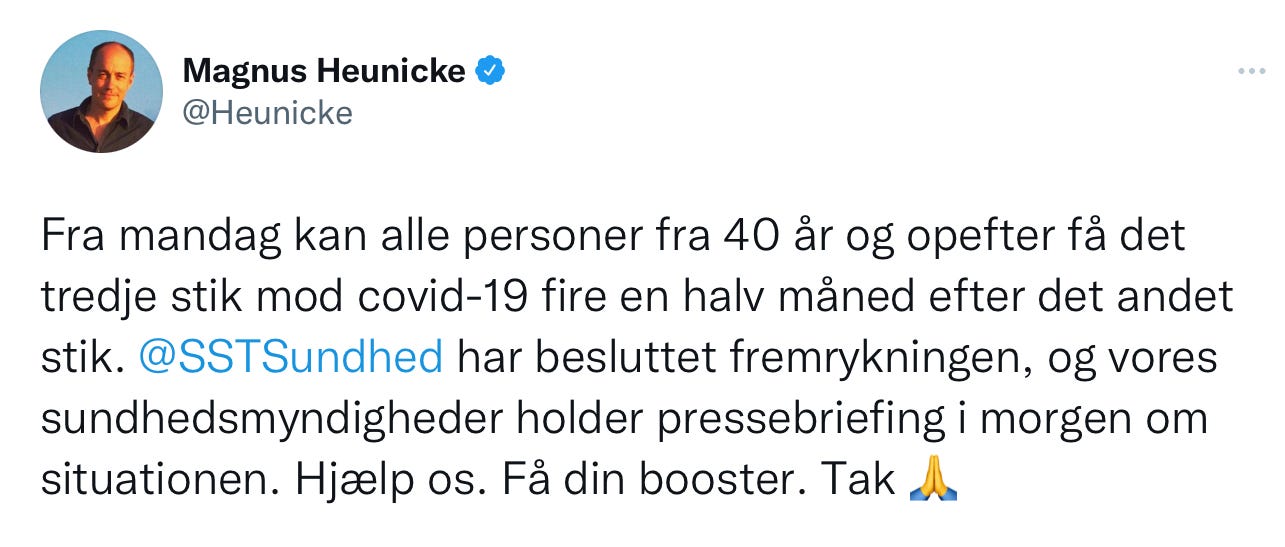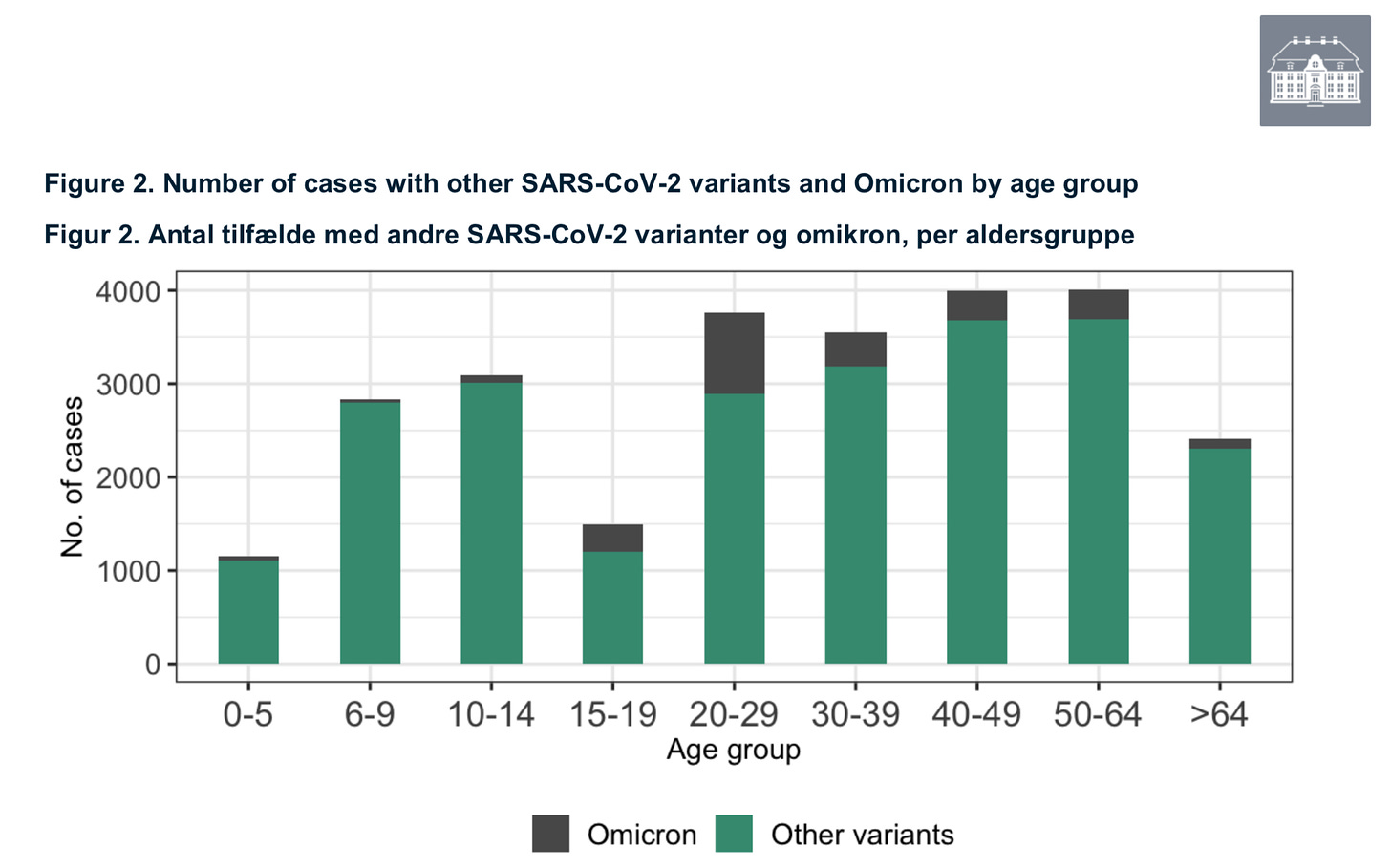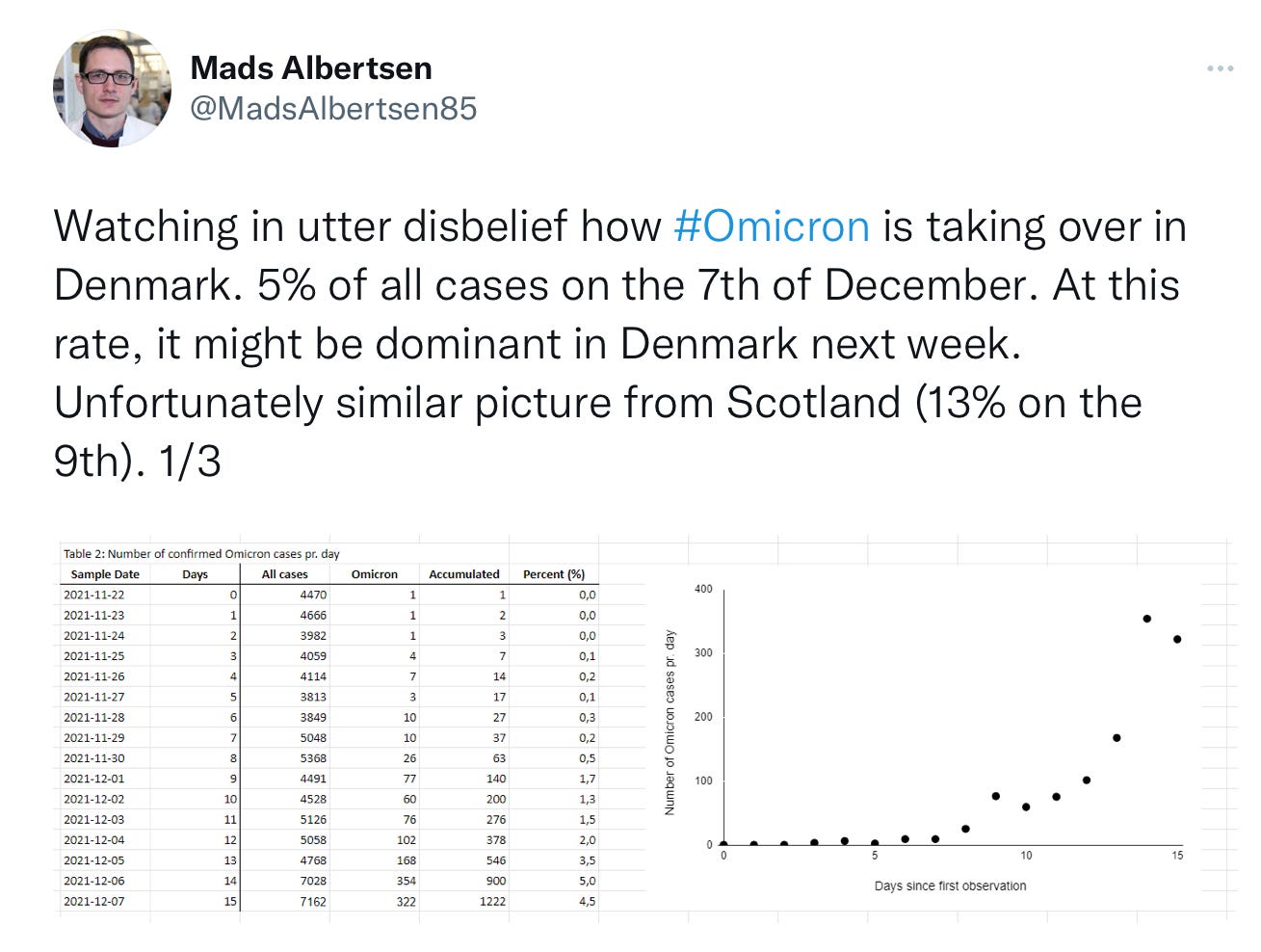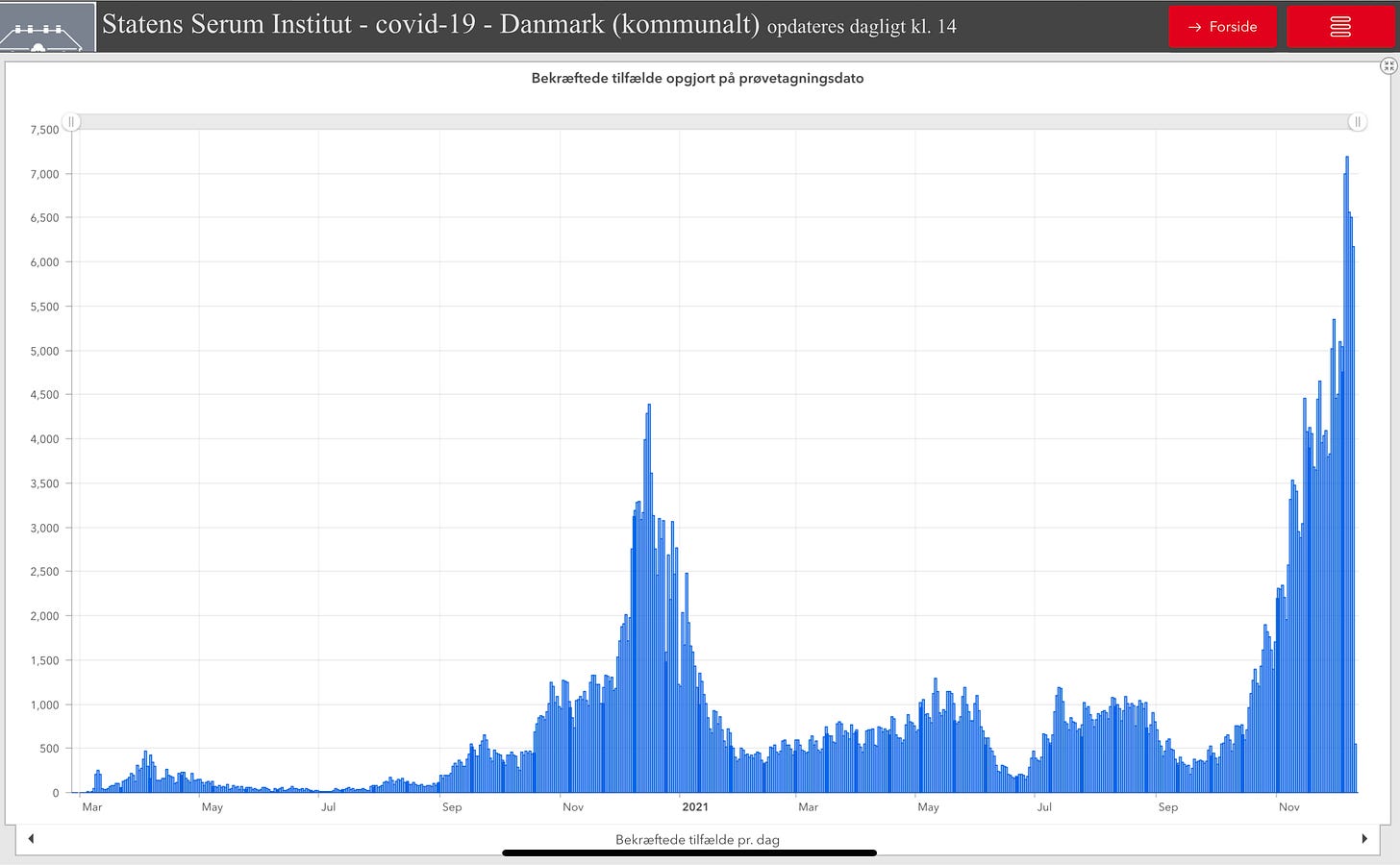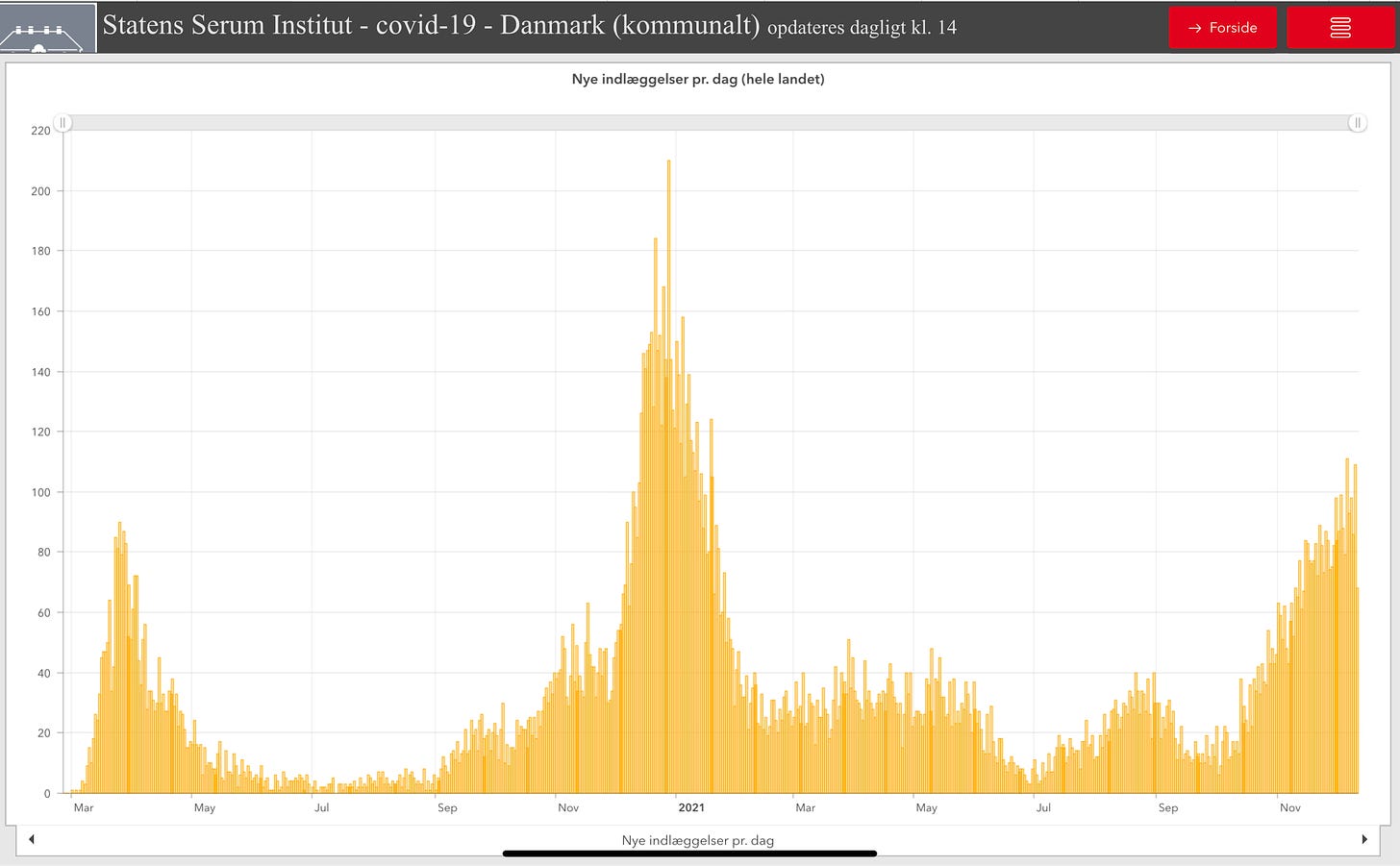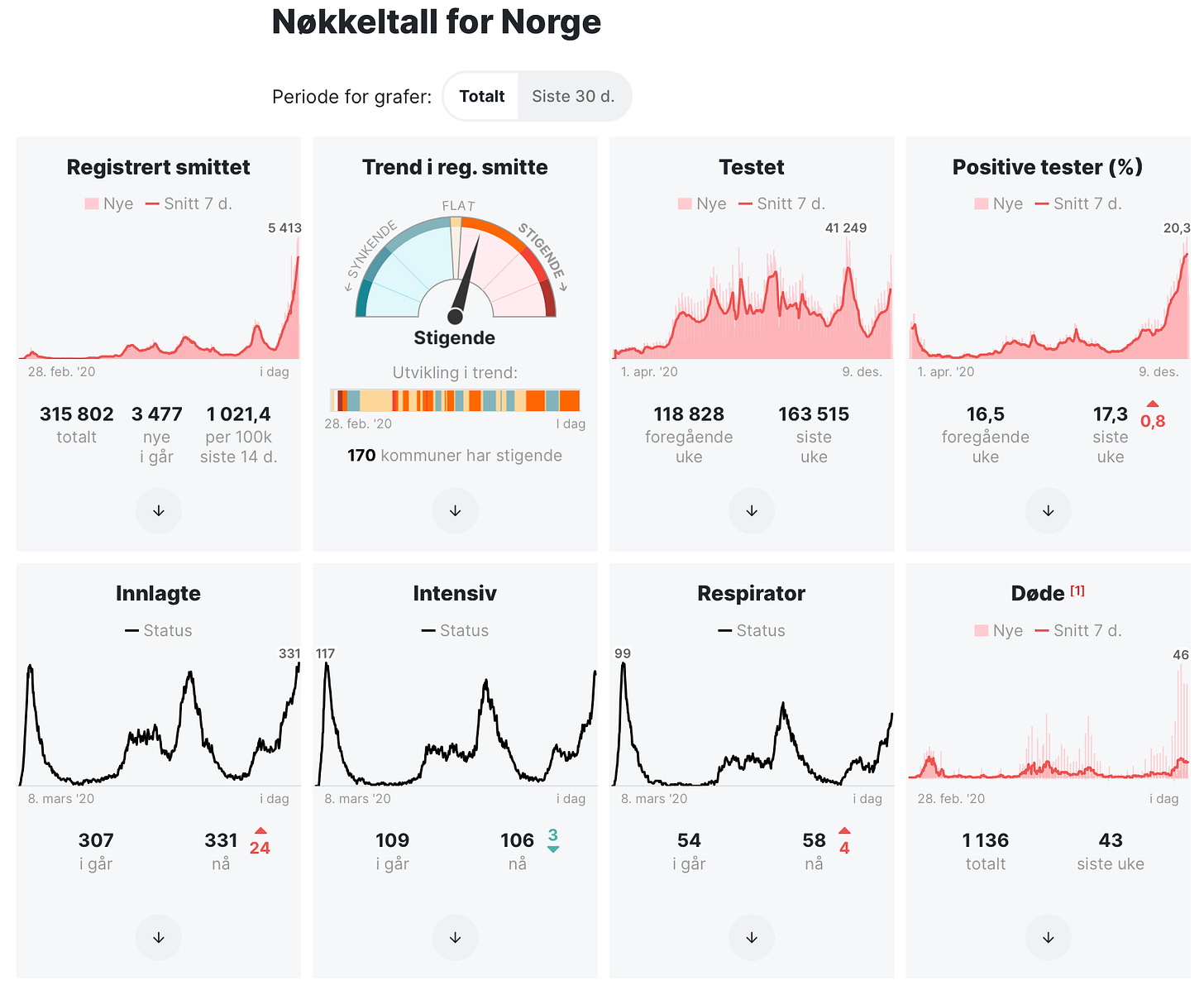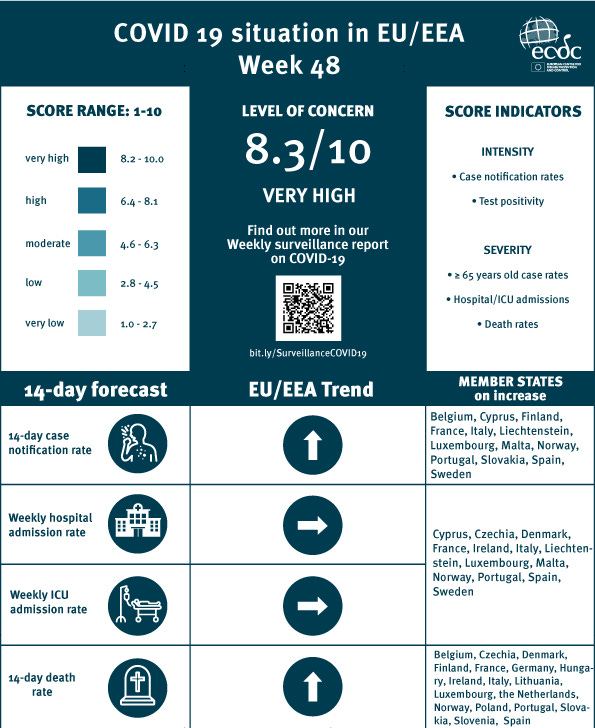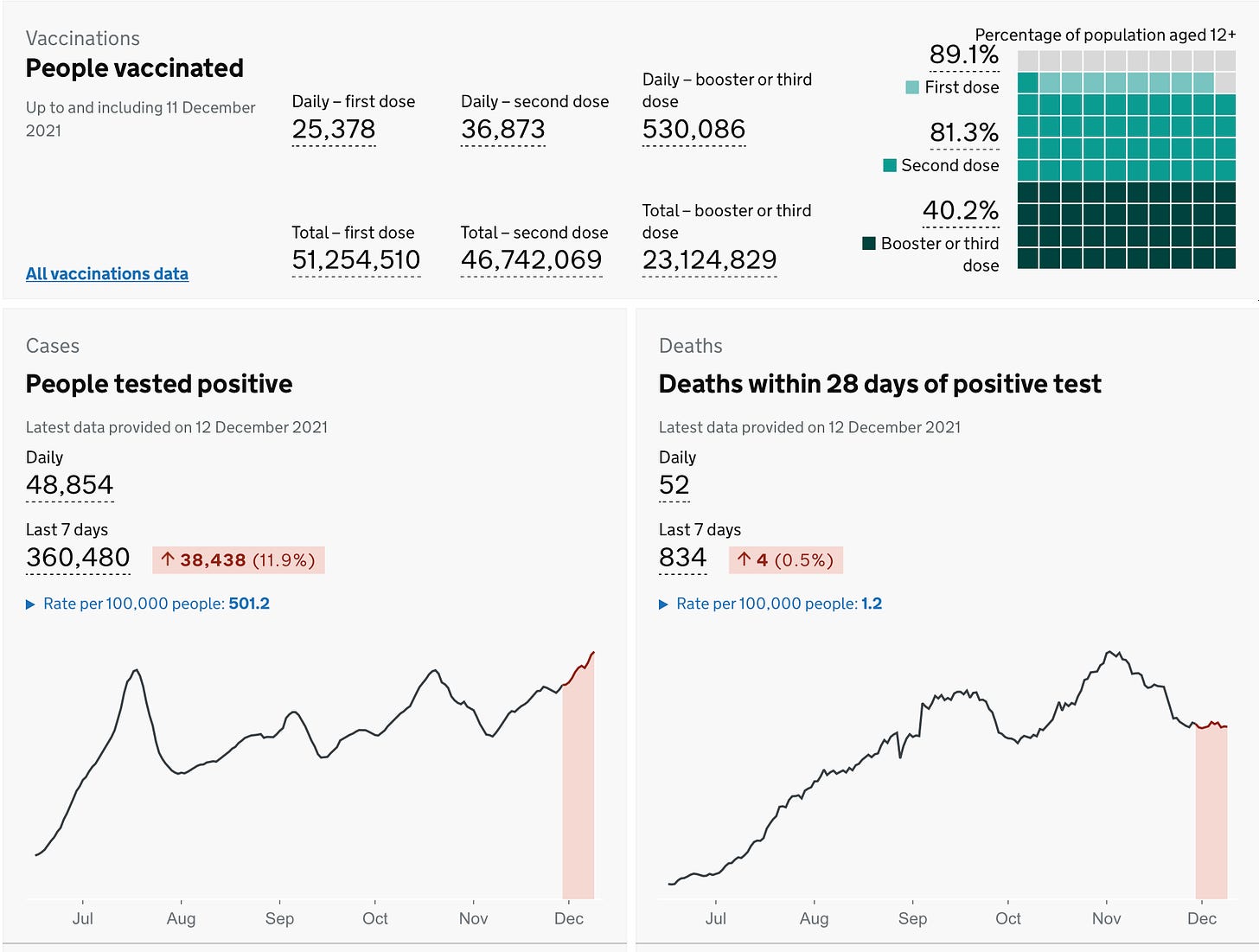Monday Morning News & Notes
What took the Alpa and Delta variants weeks to do in Denmark, Omicron is doing in days.
🇩🇰
As of this morning, everyone 40 years old and older can make a vaccination appointment to get a vaccine booster dose. Health Minister Magnus Heunicke made the announcement late Sunday afternoon. This is due to concerns about the number of Omicron cases rocketing upward in Denmark.
A press conference to provide more information will come later today.
-
Denmark’s different regions have already begun to increase vaccination capacity to meet the stepped-up booster dose targets.
Region Hovedstaden (Metro Copenhagen) is scaling up its vaccination efforts to administer 330,000 doses per week. As part of the effort to streamline the region is ending drop-in vaccinations at sites run by Copenhagen Medical and Practio. Everyone has to book an appointment now.
Regional Council Chair Lars Gaardhøj suggested people also explore their options.
“We need all our vaccination channels when we have to vaccinate so many citizens. It is therefore a good idea to investigate the possibility of being vaccinated at a family doctor or at the pharmacy. It is important that everyone who can is vaccinated as soon as possible and better today than tomorrow.”
In Region Sjælland, vaccination capacity has been ratcheted up to 160,000 inoculations a week and it has brought family doctors on board to help administer shots. It will also extend opening hours at its vaccination sites.
In Region Nordjylland there is a new vaccination center in City Syd in Aalborg. It offers drop-in vaccinations, but only on Wednesdays and Thursdays, outside of that an appointment is required. As of Wednesday, another new vaccination site will open at Vandmanden 5, also in Aalborg. This Wednesday and Thursday it will offer drop-in vaccinations for anyone with an invitation to get a 3rd dose. The region is working to reach a weekly capacity of 50,000 vaccinations.
In Region Syddanmark, four new vaccination sites will open there doors as of this morning. They will be in Assens, Haderslev, Brørup, and Fredericia. The four are expected to increase weekly vaccinations to 10,000. The two vaccination facilities in Assens and Haderslev appointments are required while the two in Brørup and Fredericia will service both vaccination appointments and drop-ins.
-
Omicron variant infections are increasing at lightning speed in Denmark. As of the latest daily report on Sunday afternoon from the Staten Serum Institut there are now 2,471 confirmed cases of the new variant, an increase of 631 from Saturday’s 1,840 cases.
Of the confirmed cases so far, 74.6% (1,843) have been people who are fully vaccinated. There are now 27 hospitalizations with people infected with the new variant.
-
The Omicron is exploding at such unbelievable speeds that one expert says it could become the dominant COVID strain in Denmark by as early as Tuesday, less than three weeks after the first two cases were confirmed in the country. Aalborg University’s Professor Mads Albertsen led the team that pioneered the analyzing and sequencing of COVID tests. He is also a member of the Staten Serum Institut’s ‘risk group.’
“If it follows current development, then it will probably take one to two weeks before it crosses the 50-percent mark, with cases being the Omicron variant. When Alpha and Delta came, it also went fast. But that development took many weeks. Now it takes days.”
-
Denmark’s Epidemic Commission has raised the national COVID risk level to its second highest level, 4. As the number of infections soars and the Omicron variant explodes, the commission in increasing the risk level notes there is the “potential for high disease burden in the coming period.” Looking at Denmark’s five regions, the commission has every one, except for Region Midtjylland, also as a risk level of 4.
-
The Danish Health Ministry has reduced the gap between the 2nd COVID vaccine dose and a booster dose for everyone under the age of 40 to five and a half months. The ministry says anyone who had their 2nd dose five and a half months or longer ago can get a booster dose now whether they have had a vaccination invitation or not.
Health Minister Magnus Heunicke:
“We are currently dealing with the Omicron variant, which is enormously contagious and which is on its way to taking over the Danish epidemic. Therefore, it is crucial that we speed up the vaccination roll-out, so that we are equipped as well as possible to withstand the winter months with a more contagious virus variant. There is spare capacity in our vaccination centers, so we can administer booster doses as fast as appointments are made.”
A third dose can be administered at a vaccination center with an appointment, some family doctors can also inoculate people, and at private clinics without an appointment.
-
Denmark’s Ministry of Foreign Affairs has announced that as of midnight tonight everyone flying into Denmark from Istanbul Airport will need to take COVID tests on arrival. This is due to Omicron variant concerns
At the same time, the ministry says it is removing the same requirement that was in place for everyone arriving on flights from Dubai.
-
Denmark is reporting 18,194 COVID infections and 31 more coronavirus deaths over the weekend. On Friday, it reported 6,599 new corona cases, then 5,606 on Saturday, followed by another 5,989 on Sunday.
On Sunday, there were 360,084 total corona tests done, of which 182,314 were PCR tests equaling a positivity percentage of a very high 3.28%.
-
COVID hospitalizations (468) continue to head upward (+13) while the number of infected people in an ICU (65) also crept up (+5) and of those the number on a ventilator (42) increased as well (+6).
-
On the vaccination front, there were 39,392 total inoculations on Sunday, and while 8,097 people had their 1st dose, the lion’s share of vaccinations continued to be booster doses, 29,517. The percentage of the population with a 3rd dose has now hit 20.5% while 79.2% of the total population has one vaccine dose and 76.5% have two.
-
The Danish National Health Board says the vaccination effort to inoculate children five to 11 years old has gotten off to a good start. The agency says as of Friday almost 49,000 kids (11% of the age group) have had a 1st vaccine dose and a out 80,000 had booked a vaccination time for the “near future.” Another 2.5 million invitations to children in the age group have gone out for parents to receive before the New Year.
Deputy Director Helene Probst:
“I am pleased to see that many parents have chosen to accept the vaccination offer for their children. The infection is high right now among younger children and it is spreading from those children, to their parents, and their grandparents. Therefore, vaccinating children is a crucial tool to reduce infection spread. My hope is that in the coming weeks we will see even more children out at one of the many vaccination sites. If you as a parent are in doubt about whether you should get your child vaccinated, I would encourage you to visit the Danish Health and Medicines Authority's website. Here you can find answers to many of the questions that may arise when you as a parent have to decide whether your child should be vaccinated against COVID. You can also talk to your family doctor.”
-
It seems that the press conference last week from Danish Statsminister Mette Frederiksen seems to have caused a mini-stampede online to book vaccination appointments. DR is reporting that beginning at 6:30pm last Wednesday night, when Mette Frederiksen began her televised news conference announcing new restrictions, and in the hours afterward 29,265 people went online, logged in, and booked 43,344 vaccination appointments.
The office manager for Region Nordjylland, Lone Kaalund Thiel, told DR says this is a fairly usual impact whenever there is a major televised COVID news conference.
“In general, I can say that when we look at our queuing systems, that there is an increased demand to get on the systems every time there have been press conferences. Many log on and book, and there are also many who just log on to see what the situation is.”
-
The Danish National Health Board has issued new recommendations for healthcare professionals on how best to help people suffering from long-COVID navigate through the healthcare system. Long-COVID is when people survive a coronavirus infection, recover, but still struggle with an array of symptoms for months afterwards.
Section Leader Line Riddersholm:
“The important thing is to take as a starting point the patients' symptoms and how they are affected by them in everyday life. Depending on how complex the symptoms are, how severely impacted the patient is, and how long the symptoms have lasted, the patient will be able to receive treatment from their own doctor or at the hospital. Municipalities are responsible for offering rehabilitation when needed.”
On top of the recommendations for healthcare staff, the National Health Board has also conducted a literature review to add to the knowledge base about long-COVID.
“Both here in this country and around the world, a lot of research is being done in the area of long-COVID. One of the good things is that there has been more knowledge about late effects in children, and that it indicates that only a small group of children experience long-COVID.”
-
With new restrictions being levied and the epidemic situation getting worse in Denmark, the DSB will offer free refunds of all rail tickets up until January 9. This also applies for the orange tickets, which outside of this are usually non-refundable. The national rail agency says it is trying to respond to COVID concern levels across the country and anyone who may now not feel so positive about getting on a crowded train.
🇮🇱 🇬🇧 🇩🇰 🇧🇪
While Israel has already closed its borders to all non-essential travelers due to concerns over the Omicron variant, it took things a step further on Sunday. Israel has issued a travel ban, meaning its citizens cannot travel to, the UK, Denmark, and Belgium due to the high numbers of Omicron variant infections in each country.
🇸🇪
Sweden will table its first COVID update of the week on Tuesday.
-
Region Stockholm is seeing rising infection numbers and a worrying increase in the number of COVID hospitalizations. Overall, 142 people were admitted to hospital with a coronavirus infection last week, an increase of 58 from the week before.
Chief Physician Johann Bratt:
“The number of patients in our hospitals with COVID is increasing rapidly. It is mainly unvaccinated young people who during the last twelve weeks have been so ill that they need hospital care.”
Bratt says that alone is a concerning problem, but it is being made worse.
“At the same time, hospitals are now starting to see patients who have been affected by seasonal flu and also need hospital care. This, together with other healthcare needs, means that the county's hospitals have a very strained situation. It is being made more difficult by the fact that healthcare staff also suffer from respiratory infections, which means that they have to stay at home sick.”
Of the COVID hospitalizations 13 are in an ICU.
The region has also confirmed 14 cases of the Omicron variant so far, with four of those infections with no link to any travel indicating community spread.
-
The Swedish Public Health Agency is urging people to go get their flu shots as influenza activity begins to pick up. The agency is in particular warning people in high risk groups like those with chronic diseases, pregnant women, and seniors 65 years old and older.
The Agency says since the beginning of November the number of flu cases has increased. For the most part, it is Influenza A (H3N2) that has been circulating, which is a strain that usually hits older people harder.
Agency Epidemiologist AnnaSara Carnahan:
“We see that we now have a spread of infection in several regions and sporadic cases in most regions. Therefore, it is now high time for people at risk to be vaccinated to get protection against serious illnesses. This applies, for example, to both children and adults who have heart or lung disease, diabetes or other risk factors.”
The agency says it takes two weeks after getting the shot for the vaccine to reach full effectiveness. Sweden, like many other European countries, is very concerned about the possibility of influenza making a massive return after COVID restrictions all but wiped out the previous two seasons. Epidemiologists have warned that, especially for young children, not having seen the flu for two years could lead to a decrease in natural immunity, potentially allowing the usual winter bug to come roaring back.
🇳🇴
Norway has added 7,908 infections and had no new corona deaths since Friday’s update.
COVID hospitalizations (331) have jumped (+24) that is the highest number of hospitalizations ever in the pandemic. The number of infected people in an ICU (106) dropped slightly (-3) and of those the number on a ventilator (56) crept upward (+4).
So far, 78.9% of Norwegians 12 years old and older have had one vaccine dose, 71.9% have had two doses, and of those 17.4% have had a booster dose.
-
Due to concerns about staffing shortages in hospitals, healthcare clinics, and other “critical societal functions” Norway’s health ministry has tweaked tough quarantine rules specific to an Omicron infection. When the new variant was determined to be a threat, the health ministry mandated a ten day quarantine for the infected person, their household, and any and all close contacts. This led to a major increase in people having to quarantine and according to the ministry it has “received feedback that some institutions will not be able to manage staffing properly through the weekend.”
As of Saturday, anyone working in a “critical societal function” like healthcare workers can, on the basis of a negative COVID test, paise their quarantine to go to work. The quarantine otherwise remains in place. The exception does not apply to people who live in the same household as a person infected with the Omicron variant.
The only other way out of the ten day quarantine due to suspected Omicron exposure is a negative COVID test on day seven. Or if the initial exposure was not determined to be the Omicron variant.
-
The Norwegian Institute of Public Health is noting that respiratory infection activity other than COVID is beginning to pick up. It says an early return of the RS virus has peaked and is now “declining sharply” but infections activity remains high. Influenza cases are still “very low” but the NIPH notes activity on that front has increased in week 47. It says in that week hospitalizations for respiratory infections including influenza and the RS virus, accounted for 83% of admissions, while COVID cases were responsible for the remaining 17%.
🇫🇮
Finland does not update its COVID numbers over the weekend. It will table three days worth of data later today.
-
The Finnish Institute for Public Health confirmed 11 more Omicron variant infection cases on Friday, pushing the total at that point to 20. So far confirmed cases have been reported in the Helsinki and Uusimaa Hospital District, the South Karelia Social and Health District, and the hospital districts of Southwest Finland and Vaasa. In all but two cases, the infections were either related to international travel or to an already identified variant case.
Chief Physician Hanna Nohynek:
“However, based on preliminary studies, there is no evidence so far that the Omicron variant would evade the protection provided by the two doses of the vaccine to cause severe infection. In addition, based on studies in the UK, it appears that the third dose of the vaccine will significantly increase the protective effect against the mild disease caused by Omicron and thus probably also against having a serious infection.”
-
This week, Finnish Health Authorities will make a decision on whether to shorten the interval between a 2nd and 3rd vaccine dose. Currently, Finland requires six months between having a second dose and getting a booster. Finnish Institute for Public Health Chief Physician Hanna Nohynek says they will also discuss the merits of cross-vaccinations. This would mean a booster dose would be of a vaccine different than the initial two doses.
🇩🇪
The German government has introduced an immunization mandate for people working at hospitals, nursing homes, and a number of other healthcare clinics. In all cases, employees must be able to document their vaccination status or have proof of a recent COVID infection; otherwise they could lose their jobs. Germany’s new Health Minister Karl Lauterbach, an epidemiologist and doctor, said it is a matter of life and death.
“After two years of a pandemic, it is completely unacceptable that people who have entrusted their health to us lose their lives because unvaccinated people work in our institutions.”
Germany continues to battle a severe 4th wave even as the Omicron variant spreads rapidly there as well. On Sunday, it reported 37,478 new corona cases and another 276 deaths.
🇦🇹
As Austria ends another national lockdown, those who are not yet vaccinated remain under strict rules to not leave their homes unless for very specific reasons like work or going to get groceries. To further enforce vaccinations Austria plans to impose a fine of about €3,500 on anyone 14 years old and older who refuses to be vaccinated. The country’s health minister s plans to have the fine in place by February of the new year. Pregnant women and people with a legitimate medical reason for not being vaccinated will be exempt.
🇪🇺🦠
The European Centre for Disease Prevention and Control continues to rate the COVID situation across the EU as very high risk. At the moment the European healthcare agency puts the blame on a surge of infections from the Delta variant but considering what is happening in Denmark and elsewhere with the Omicron variant things may be about to go from bad to worse.
Overall, the COVID incidence rate in the EU last week was 797 per 100,000 people, an increase from the incidence rate of 748 the week before. This is the ninth week in a row the incidence rate in the European Union has increased.
The latest ECDC weekly COVID assessment eight countries as being of very high concern. They are Czech Republic, France, Germany, Liechtenstein, Luxembourg, the Netherlands, Norway, and Poland. Another 11 EU countries including Denmark, Finland, Greece, Ireland, and Belgium, are rated as high concern. Ten countries are of moderate concern including Sweden, Spain, Romania, and Austria.
On the vaccination front, Europe’s health agency says across the EU the cumulative uptake for a 1st vaccine dose is 82.7% with the rate of second doses being 78%. Of course, rates will differ widely from country to country.
Delta was still king on the variant side of the equation, but keep in mind those numbers are two weeks old. Up until 47, the ECDC says data from 20 EU countries has 98.6% of all sequenced positive tests being the Delta strain. The agency does add that the Omicron variant “is being detected in increasing numbers in multiple EU/EEA countries, some of which now report community transmission.”
🇬🇧
The United Kingdom has increased its national COVID alert from 3 to 4. In a statement announcing the decision, the Department of Health and Social Care said.
“Early evidence shows that Omicron is spreading much faster than Delta and that vaccine protection against symptomatic disease from Omicron is reduced. Data on severity will become clearer over the coming weeks, but hospitalisations from Omicron are already occurring and these are likely to increase rapidly.”
Prime Minister Boris Johnson in announcing an emergency Omicron booster vaccination effort, on Sunday warned of a “tidal wave of Omicron” variant infections coming. The emergency UK booster shot effort will seek to get a 3rd dose to everyone 18 years old and older by the end of December.
On Sunday, the UK Health Security Agency reported another 1,239 confirmed Omicron variant infections since Saturday’s update. That pushes the total to-date number of cases of the new variant to 3,137.
The UK reported 48,854 new corona infections and another 52 deaths on Sunday as the rate of new COVID cases, fatalities,, and hospitalizations all increased over the last seven days.
🇨🇦
Canada’s Chief Public Health Officer, Dr. Theresa Tam warned to keep Christmas gatherings small as infection activity increases and reports of community transmission of the Omicron variant begin to trickle in.
“Keeping private gatherings small is quite important at this point while we learn more. Gathering with a smaller number of people in well-ventilated places, all of those layers of protection, can still enable us to have a good time while being safer and being precautionary.”
Currently, Ontario and Quebec are seeing resurgent infection waves in daily numbers not seen since last spring. Tam pointed to federal modeling that showed if COVID transmission increased by as much as 15% or if Omicron begins to explode, which it has in every other jurisdiction so far, that Canada could see cases skyrocket to record levels of 10,000 or more infections each day. This could happen within weeks, according to the charts.
While Omicron has so far seemed to not cause any increase in the severity of infections, it looks to be by far the most infectious variant we have seen yet, with a R0 around 3.5.
“That model doesn’t model severity. But even if the proportion of those who get Omicron who get severely ill is tiny, if you get enough cases, you still have enough severe outcomes to impact your hospitals and your ICUs.”
Tam warned against international travel right now and suggested this might be a good holiday season to stay home or keep your travel plans within Canada.
-
Of the provinces that report over the weekend:
In Ontario since Friday there have been 4,536 infections, of which 1,905 have been among people with just one vaccine dose or none at all. There were also at least 13 more deaths. There are 222 people in hospital and 158 are in intensive care.
Quebec is reporting 3,735 infections and five more deaths over the weekend.
In Atlantic Canada, New Brunswick logged 238 infections and one more death over the weekend. Nova Scotia had 240 new corona cases.




